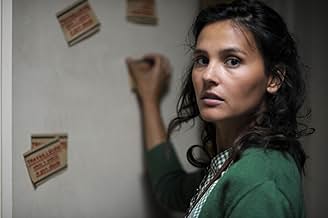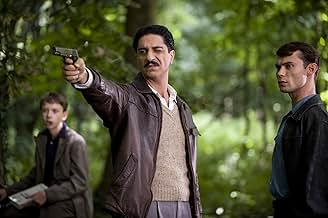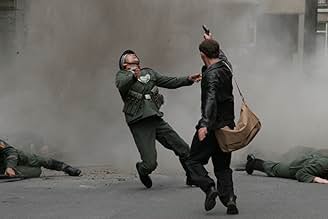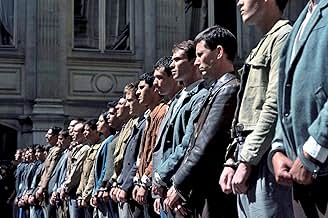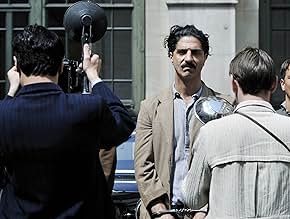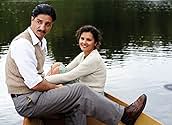The poet Missak Manouchian leads a mixed bag of youngsters and immigrants in a clandestine battle against the Nazi occupation. Twenty-two men and one woman fighting for an ideal and for free... Read allThe poet Missak Manouchian leads a mixed bag of youngsters and immigrants in a clandestine battle against the Nazi occupation. Twenty-two men and one woman fighting for an ideal and for freedom. News of their daring attacks, including the assassination of an SS general, eventuall... Read allThe poet Missak Manouchian leads a mixed bag of youngsters and immigrants in a clandestine battle against the Nazi occupation. Twenty-two men and one woman fighting for an ideal and for freedom. News of their daring attacks, including the assassination of an SS general, eventually reaches Berlin.
- Director
- Writers
- Stars
- Awards
- 4 wins & 1 nomination total
- Director
- Writers
- All cast & crew
- Production, box office & more at IMDbPro
Featured reviews
The bad guys wear black kepis!
Another angle on the French Resistance
Guédiguian's film lacks the noirish flavor of Melville or the Butch Cassidy and Sundance panache of Madsen's film; but it starts well with Grégoire Leprince-Ringuet and Robinson Stévenin as two brave young men who begin acting on their own, and later are recruited to serve a more organized cause. There were always contrasts between young upstarts and disciplined old-timers. Resistance fighters worked outside the law and sub rosa; the "shadow" army was an army of "crime." Though the phrase "Army of Crime" is a Vichy smear issued after the principals of this story were rounded up and eliminated, the resistance life always attracted rebels and outliers.
The gentle Armenian poet Missak Manouchian (Simon Abkarian) is the leader. His ballsy girlfriend Mélinée (the lovely Virginie Ledoyen) marries him and becomes a passionate supporter after his release from internment gradually turns him from peaceful propagandist to one capable of throwing a grenade into a German marching squad and taking out a dozen German soldiers (an incident neatly filmed here). He gets to know fiery young Marxist bomb-rigger Thomas Elek (Leprince-Ringuet) and swim-champion-pistol killer Marcel Rayman (Stévenin). Marcel becomes infuriated when his parents are taken away and he learns that he won't ever see them again. He begins asking one German officer after another for a light and then pulling a pistol and killing them. He's good at less close range too and gives Missak a lesson in marksmanship. Thomas blows up a Nazi literary gathering by planting a big copy of Das Kapital with a time bomb inside.
Older group leaders periodically chide the younger ones for acting independently and not maintaining cover; but it is one of the older ones who eventually names many members of the group after capture. Various group scenes, including an Armenian musical celebration with Zorba-style performances visited by a group of French cops, show that the authorities are onto the foreign communists and the rashness of one can endanger many.
We get a look at French cops called upon by German occupiers to squash the resisters. They enlist a certain Inspector Pujol ( Jean-Pierre Darroussin), who plays a dubious Judas game of informing, rounding up Jews, and gaining rapid promotion by the French Gestapo while simultaneously sympathizing with the partisans, sleeping with a Jewish girl, and doling out favors to her, including gentler treatment for her interned family members. She wants to be a partisan too, but seems destined to go the way of the anonymous protagonist of Max Färberböck's A Woman in Berlin.
The FTP-MOI throws out flyers (from above, so they won't be seen) urging the French to sabotage Vichy-run industries. Their other mission is to strike visible blows at the Nazis, assassinating major figures of the Nazis in France like General Julius Ritter.
A theme of the film is the complex bonds forged among immigrants and the loyalties among resisters. Missak , whose parents were murdered by Turks, looks upon his Parisian communist friends as his new adopted family. Marcel knows what remains of his family is only his little brother Simon (Léopold Szabatura), and so takes him everywhere; unfortunately that meant that in a raid that targets Marcel, Simon is taken away. An original touch is a homage to the young militant, Henri Krasucki (Adrien Jolivet), who took it upon himself to bring Simon back alive from the concentration camp where they were sent.
In The Army of Crime, the mix of nationalities and motivations is continually interesting and harmonizes nicely with the picture of how quite disparate individuals came together Very important also is that toward the end, Guérdiguian films sequences of the mass corralling and deportation of Jewish people by the French out of a stadium, an infamous moment that deserves to be seen as well as read about. The film is less effective in evoking strong emotion, and despite its generally favorable reception in September in France (after a Cannes summer debut), it's been criticized for a lackluster mise-en-scene. Some communist historians in France have insisted that Marcel is over-mythologized; that there was more restraint and coordination and more direct Soviet supervision than is shown. However the film's strengths remain its focus on youth and its strong ethnic and cultural mix.
This is involving, fascinating stuff, and as good an evocation of that place and time as I can think of, but it doesn't seem as personal as the other films by Guédiguian that I've seen -- The Town Is Quiet (in US theaters) and Lady Jane (SFIFF). But since he is a communist of working-class origins with an Armenian father, it may be in another sense the most personal thing he has done. Another film of his, the 2006 Armenia/Le voyage en Arménie, is about rediscovering Armenian roots.
Shown as part of the Rendez-Vous with French Cinema at Lincoln Center, March 2010.
too many characters but functional resistance movie
This is a traditional movie about the French resistance. Virginie Ledoyen leads a big cast of characters. Fewer lead characters could have intensified each person's story. There are way too many side characters in the group. The movie needs to stay on the Manouchians and Marcel and only them. It's a little stop and go with the flow. It's well filmed but needs a bit more to differentiate from the standard retelling.
Thought provoking film.
A wonderful worthy film
Did you know
- TriviaCharacters Micha Aznavourian (Serge Avedikian) and Knar Aznavourian (Christina Galstian) were, in real life, the parents of singer and actor Charles Aznavour. Whilst Charles does not feature, as a character, in the film, he is briefly mentioned by his parents (as characters), around 42' 55" into the movie, as having early success as a child singer.
- GoofsWhen showed up to the press after being arrested in November 1943, a member of the group tells a policeman the FFI will avenge them when they come. The FFI (Forces Francaises de l'Interieur) was regrouping several resistance groups and was created in 1944.
- ConnectionsReferenced in The Tonight Show Starring Jimmy Fallon: Adam Sandler/Judd Apatow (2015)
- SoundtracksString Quartet No.17 in B-flat major K. 458
Written by Wolfgang Amadeus Mozart (as Mozart)
Sung by Delphine Bardin, Laurent-Benoit Ostyn, Jean-Claude Tchevrekdjian (Claude Tcheurekdjian), Vincent Dormieu, Olivier Perrin
Enregistrés par Simon Derasse
- How long is Army of Crime?Powered by Alexa
Details
- Release date
- Country of origin
- Official site
- Languages
- Also known as
- Đội Quân Chính Nghĩa
- Filming locations
- Production companies
- See more company credits at IMDbPro
Box office
- Gross US & Canada
- $37,031
- Opening weekend US & Canada
- $8,102
- Aug 22, 2010
- Gross worldwide
- $1,199,877
- Runtime
- 2h 19m(139 min)
- Color
- Sound mix
- Aspect ratio
- 1.85 : 1


